Bootbrush Stations
PlayCleanGo – Stop Invasive Species In Your Tracks is a Trademarked logo and set of invasive species messages targeting terrestrial activities
Basic Message: Help Prevent the Spread of Invasive Plant and Animals
- Arrive with clean gear
- Burn local or certified firewood
- Use local or weed-free hay
- Stay on the trails
- Before leaving, remove mud and seeds
Goal: Promote responsible prevention actions pertaining to terrestrial invasive species.
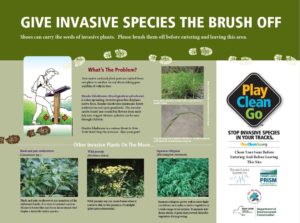
Objectives:
- Incorporate the PlayCleanGo message into NYS invasive species outreach program
- Initiate a pilot project using the PlayCleanGo messaging in the FL PRISM region
Play Clean Go sign with one highlighted invasive species and three others highlighted. The invasive species highlighted can be altered to specific locations and invasive species of concern. Logos can be altered to include specific logos. Pictures of other signs with different species highlighted are available here:
https://hws.box.com/s/o0qqwnu2omkk99b6a183d3ke4l02wy7z
Partners commit to building the sign using materials supplied by the Finger Lakes PRISM and to take photos/ post on social media your community using the bootbrush station.
| Bootbrush construction at the NYS DEC Avon Office by HWS summer research student, Ren Workman, and the Excelsior Conservation Corps. interns in the Finger Lakes. Instructions and supply list is below. Bootbrushes were installed on the NYSDEC forest land during the summer of 2016. | ||
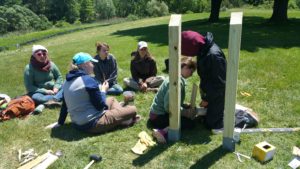 |
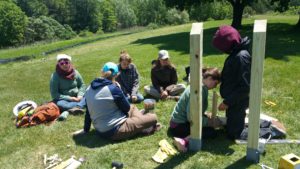 |
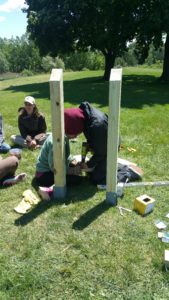 |
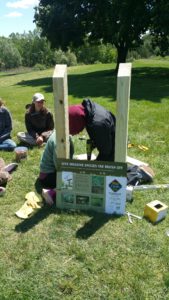 |
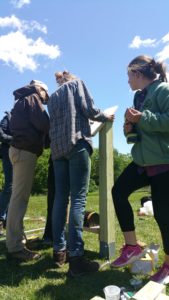 |
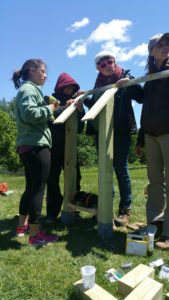 |
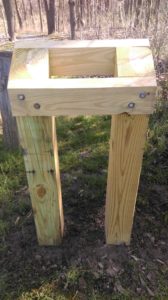 |
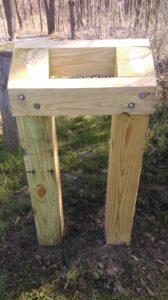 |
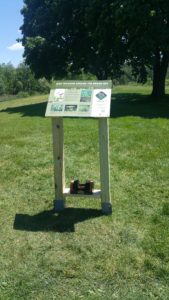 |
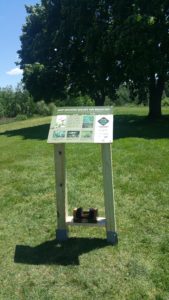 |
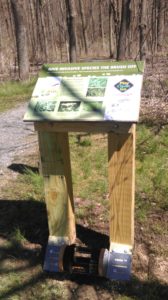 |
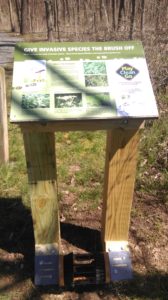 |
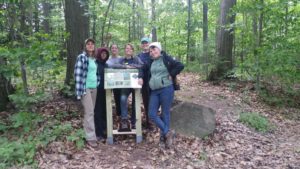 |
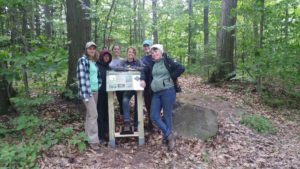 |
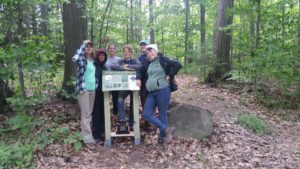 |
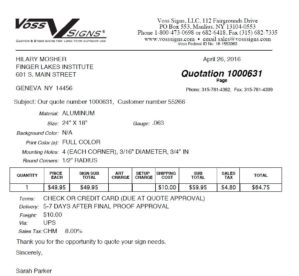
Invoice for the printing of one aluminum sign with the specifications for printing from VOSS Signs, Manlius, NY.
Supplies per station:
- 4”x4”x12’ pressure treated lumber (make sure partner can transport a 12’piece of lumber, otherwise get 2 x 8’ or 10’ pieces)
- Outdoor rated plywood (or similar) Or 1”x6’x10 lumber for frame
- 3/16” Lag bolts and screws that fit into the four corner holes
- Ready to use Concrete Mix (Quikrete or similar) – one or two 50 lb bags, OR, use post wedges or post screws with 4 x 4 anchors
- Water to mix cement (unless using post anchors)
- Deck screws
Tools:
- Post hole digger
- Screw gun with full battery and drill bit for lag bolt
- Level
- Rubber mallet if using post anchors
Method:
- Cut one side of each of the two 4”x4” lumber posts at 45 degree angles at desired height.
- Dig holes with post hole digger to place concrete and set posts. Ensure that the posts are level and plumb – refer to online guides to help (https://www.lowes.com/projects/lawn-and-garden/setting-a-post-with-concrete/project)
OR, use a post hole screw with a 4 x 4 mount if you choose not to use cement (instructions to use here: https://www.homedepot.com/catalog/pdfImages/71/7130a328-b84f-4ba0-81e5-021b74dd13ec.pdf)
- Place posts in ground/anchor posts and make adjustments for height and width.
- Cement posts into ground making sure they are level. Let dry- if using cement.
- Trace outline of sign and sign corner holes onto plywood. Cut plywood and drill holes to match sign.
OR cut 2 x 4 x 6 lumber to make a frame for the sign
- Use deck screws to attach plywood to top of 4”x8’ posts or use the 2 x 4 x 6 frame pieces to 4 x 4 posts.
- Lag bolt sign to plywood
- Attach bootbrush to piece of external-grade plywood with the same footprint as the bootbrush – this adds rigidity and keeps the brush off the ground. Alternatively, use a plate OR add a 2” x 6” board and attach to 4 x 4 posts
- Screw bootbrush into 4×4 posts.
- Admire your work.
Suggested improvements:
Paint or stain 4×4 posts.
Organisms that have text:
- Japanese stiltgrass
- Swallowworts
- Knotweeds
- Garlic mustard
- Slender falsebrome
- Autumn olive
- Multiflora rose
- HWA
- Border privet
- Crown vetch
- Spotted knapweed
- Wild parsnip
- Common reed
- Asiatic bittersweet
- Canada thistle
- Smooth brome
- Common tansy
- Invasive earthworms
- Canada thistle
- Smooth brome
Videos of installation at Baltimore Woods Nature Center:
- Measuring to dig the holes: https://youtu.be/doCA3llNh6E
- Bootbrush holes dug: https://youtu.be/oDmSOXopTnM
- Adding gravel for stability: https://youtu.be/WhjGwBXrlys
- Adding dirt on top of gravel: https://youtu.be/qK108kUECpA
- Final gravel additions: https://youtu.be/zOBzkdXGu80
Ready for a sign? Send an email to Hilary Mosher at mosher @ hws.edu with the following information:
- Species to highlight
- Three additional species to include
- High-resolution logo
- Physical address to send sign and bootbrush
- Preferred lumber store
- Date requested

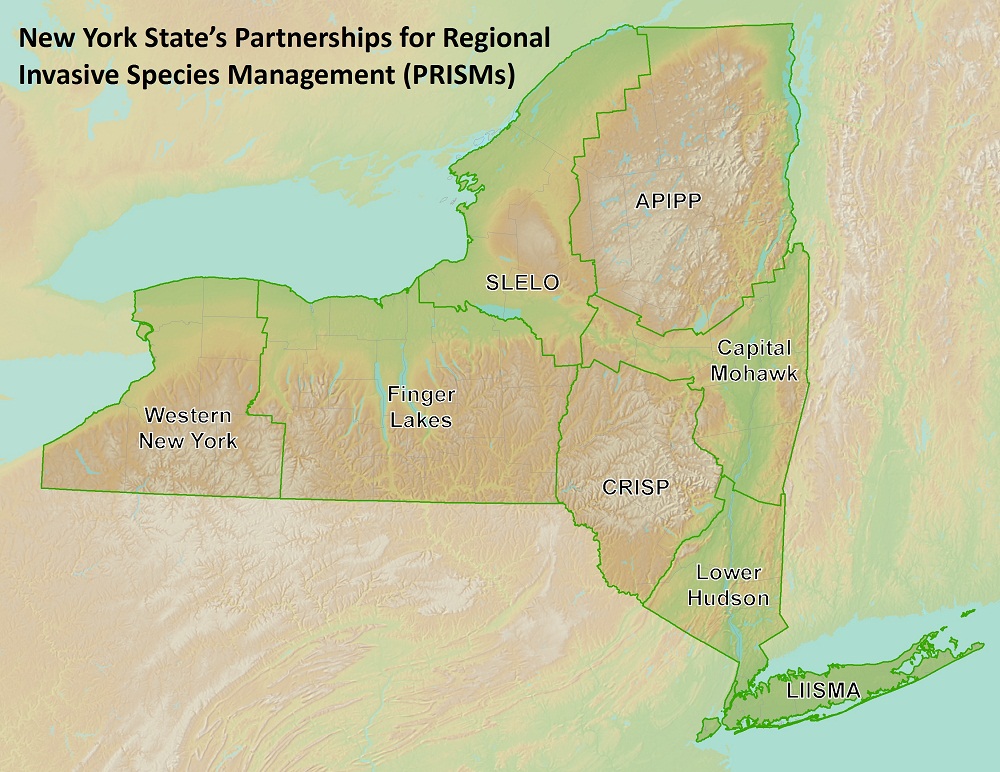


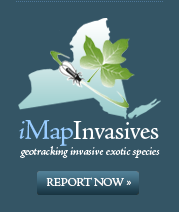
1 Comment on "Bootbrush Stations"
Trackback | Comments RSS Feed
Inbound Links